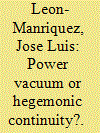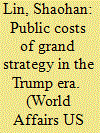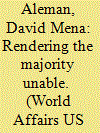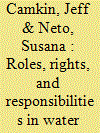| Srl | Item |
| 1 |
ID:
154418


|
|
|
|
|
| Summary/Abstract |
This article argues that the gradual decline of the United States’ economic presence in Latin America—and particularly in South America—reads as a manifestation of Washington’s hegemonic attrition in the world. Indeed, concerns over the Chinese incursion in Latin America and the increase of the pressures of the American hard line could transform the region into a scenario of geopolitical dispute between the two great powers. I first analyze the history of the relations between the United States and Latin America, which have followed a complex trajectory of interest, coercion, consensus, and carelessness. I then focus on bilateral relations since the 1990s and specify the political and economic transformations of Latin America in the first years of the twenty-first century and the consequent paralysis of the United States to understand these changes. The article then summarizes the contours of the dynamic commercial relations between Latin America and China, an emergent actor in the region. I conclude with an examination of the U.S. responses to Chinese presence in the Western hemisphere.
|
|
|
|
|
|
|
|
|
|
|
|
|
|
|
|
| 2 |
ID:
154416


|
|
|
|
|
| Summary/Abstract |
American grand strategy is at a crossroads. The preferred trajectory of
president-elect Trump, hardball isolationism and nationalism, runs counter to
the American tradition of global leadership and liberal interventionism. Despite
Trump’s preference for a new grand strategy, it is far from preordained that he
will successfully resist Washington’s perennial pull of hegemony once sworn
into office. Therefore, it is imperative to examine the strategic preferences of
the American public, given that it has to bear the costs of this grand strategy.
So what can one expect when the public is disinterested in supporting such an
ambitious grand strategy?
|
|
|
|
|
|
|
|
|
|
|
|
|
|
|
|
| 3 |
ID:
154417


|
|
|
|
|
| Summary/Abstract |
The Founding Fathers conceived formal counter-majoritarian restrictions
aimed specifically to “render the majority unable”: to prevent the majority from
trampling on minorities in the U.S. democratic system. This article contends that
several such formal restrictions actually fail to protect contemporary minorities as the founders imagined they would. Indeed, counter-majority restrictions embedded
in the Electoral College, the Senate, and the judicial review may actually prohibit
such protection. Using a comparative politics approach, this article builds
on theoretical arguments and data that evaluate democratic functionality and
fairness based on level of social equality provisions as well as optimality of voter
participation. I find that certain counter-majoritarian procedures are empirically
linked to higher inequality levels across twenty-one advanced democracies. This
political suboptimality is reflected in a significant correlation between higher Gini
coefficients and majoritarian systems (with the United States in first place) in the
sample and also between lower scores and consensus democracies. I argue that
comparative analysis shows that some criticisms hitherto only leveled at the United
States are present in an entire family of systems—the majoritarian ones—which
begs significant critical questioning of the impact of institutional design on the
effectiveness of social policies and inclusive democratic procedures.
|
|
|
|
|
|
|
|
|
|
|
|
|
|
|
|
| 4 |
ID:
154419


|
|
|
|
|
| Summary/Abstract |
Numerous commentators have highlighted the criticality of improving water governance to help address current and future water challenges. But whose job is it? In water governance, what should we expect from our governments? What should commercial water users expect from each other? What changes should environmental and social advocates expect as a result of their representations on behalf of stakeholders who have little or no voice? And what should governments expect from the communities they serve? This article briefly examines the rights and responsibilities of various actors in water governance through a selection of key water issues. We suggest that discussions about water are often unbalanced, overemphasizing the rights of large water users and underemphasizing the responsibilities all parties have toward achieving effective and efficient water governance. Among all the responsibilities in water governance, none is more fundamental than our shared responsibility toward intergenerational equity. This shared responsibility can and should be the rallying point around which we gather to improve water decisions at all scales, from local streams to national policies and global agreements.
|
|
|
|
|
|
|
|
|
|
|
|
|
|
|
|